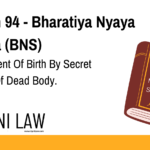Code – Section 82 BNS
(1) Whoever, having a husband or wife living, marries in any case in which such
marriage is void by reason of its taking place during the life of such husband or wife, shall be
punished with imprisonment of either description for a term which may extend to seven
years, and shall also be liable to fine.
Exception.—This sub-section does not extend to any person whose marriage with
such husband or wife has been declared void by a Court of competent jurisdiction, nor to
any person who contracts a marriage during the life of a former husband or wife, if such
husband or wife, at the time of the subsequent marriage, shall have been continually absent from such person for the space of seven years, and shall not have been heard of by such
person as being alive within that time provided the person contracting such subsequent
marriage shall, before such marriage takes place, inform the person with whom such marriage
is contracted of the real state of facts so far as the same are within his or her knowledge.
(2) Whoever commits the offence under sub-section (1) having concealed from the
person with whom the subsequent marriage is contracted, the fact of the former marriage,
shall be punished with imprisonment of either description for a term which may extend to ten
years, and shall also be liable to fine.
Explanation of Section 82 BNS
What Does This Section Cover?
- Bigamy is illegal unless the previous marriage is legally dissolved or the spouse is presumed dead.
- If the fact of a prior marriage is hidden, the punishment is more severe.
- This law protects spousal rights and prevents fraudulent marriages.
Key Legal Aspects:
- General Punishment: Up to 7 years of imprisonment + fine.
- If Prior Marriage is Concealed: Up to 10 years of imprisonment + fine.
- Hindu, Muslim, and Special Marriage Act Implications:
- Under Hindu Law, bigamy is strictly prohibited (Section 17 of the Hindu Marriage Act, 1955).
- Muslim Law allows multiple marriages but with conditions.
- Special Marriage Act, 1954 applies to interfaith and civil marriages, restricting bigamy.
🔗 Read Section 17 of Hindu Marriage Act
Illustrations
Example 1: Second Marriage While First Spouse is Alive
A man, already married, marries another woman without divorcing his first wife. Since the first marriage is legally valid, the second marriage is void, and he can be punished under Section 82 BNS.
Example 2: Concealment of First Marriage
A woman hides the fact that she is already married and remarries. When the second spouse finds out, they file a case. Since she concealed her previous marriage, she faces up to 10 years of imprisonment.
Example 3: Exception – Spouse Missing for 7 Years
A man’s wife has been missing for 8 years, and he has had no communication with her. He remarries after informing his new spouse about the situation. Since he followed legal requirements, this does not count as bigamy.
Common Questions and Answers on Section 82 BNS
1. Is Section 82 BNS a bailable offense?
- It is generally non-bailable, meaning bail is not easily granted.
2. What if the first marriage is invalid?
- If a court has declared the first marriage void, the second marriage is legal.
3. What if the first spouse is presumed dead but later returns?
- If a person remarried after 7 years of no contact, but the first spouse returns, the second marriage remains valid if due diligence was followed.
4. What happens if someone from another religion follows different marriage laws?
- Hindu and Special Marriage Acts prohibit bigamy.
- Muslim Law allows polygamy but with specific conditions.
5. Can a person be punished if they were unaware of their spouse’s previous marriage?
- The spouse who committed bigamy is punished, not the person who was deceived.
Conclusion
Section 82 BNS protects individuals from fraudulent bigamy and ensures legal accountability. If you or someone you know is facing a legal issue related to marriage fraud or bigamy, consult a legal expert today!
For detailed legal guidance, visit ApniLaw today! 🚀








